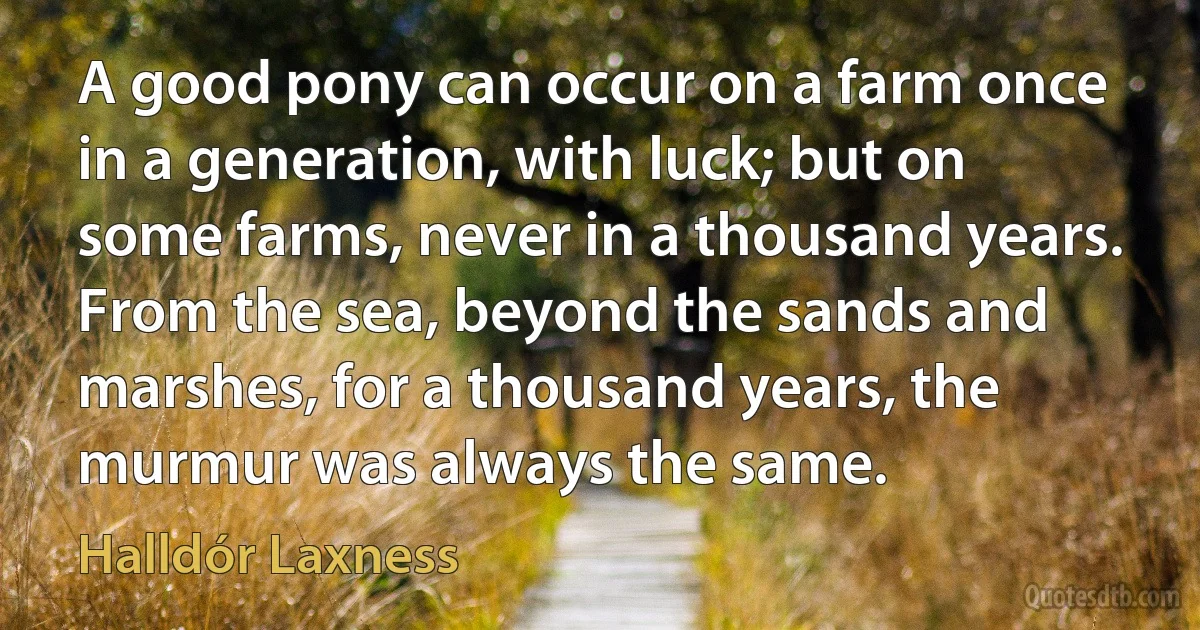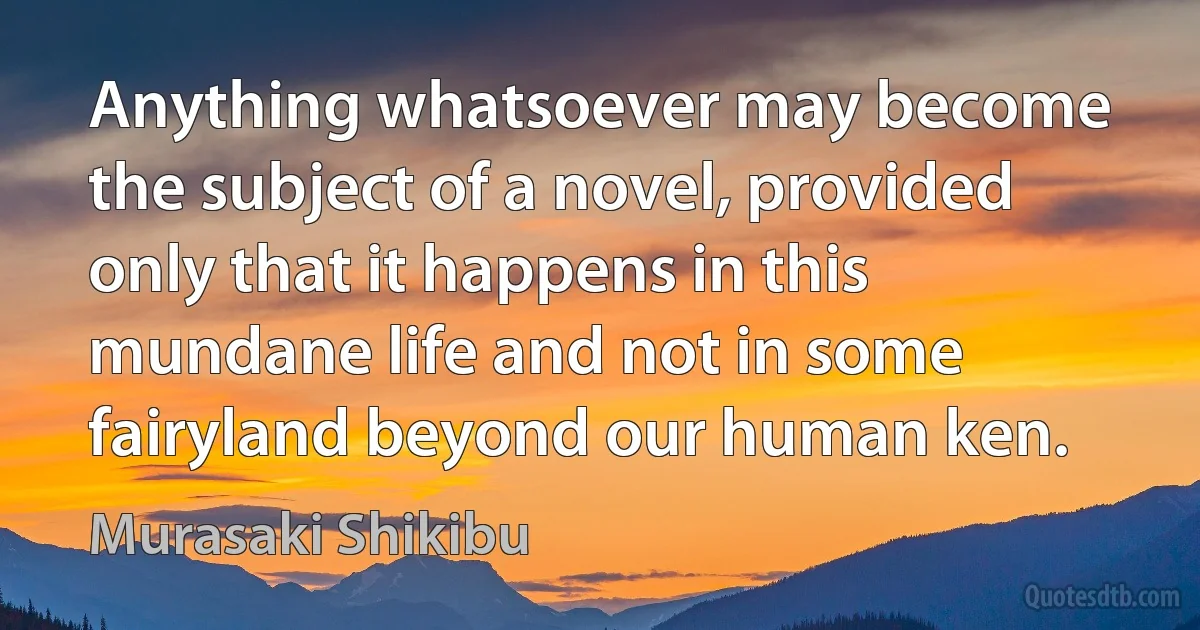Beyond Quotes - page 78
I'm afraid I'm not very good at Latin, said the superintendent. On the other hand I sometimes think about arithmetic; and in particular about one number – the number One. But I will admit that it is also the most incomprehensible number in the world. Beyond this particular dimension I know only one thing which is supernatural, even though it may well be the reality that affects mortal men most deeply; and that is Time. And when one comes to think about this strange place I was telling you about, the world that is only One, and its connection with the only supernatural thing we know, Time, then everything ceases to be higher or lower than anything else, larger or smaller.

Halldór Laxness
Out of this folk mind, turned into stories and crowded with thousands of years of life, grew, literally, the Chinese novel. For these novels changed as they grew. If, as I have said, there are no single names attached beyond question to the great novels of China, it is because no one hand wrote them. From beginning as a mere tale, a story grew through succeeding versions, into a structure built by many hands.

Pearl S. Buck
What we should do, I suggest, is to give up the idea of ultimate sources of knowledge, and admit that all knowledge is human; that it is mixed with our errors, our prejudices, our dreams, and our hopes; that all we can do is to grope for truth even though it be beyond our reach. We may admit that our groping is often inspired, but we must be on our guard against the belief, however deeply felt, that our inspiration carries any authority, divine or otherwise. If we thus admit that there is no authority beyond the reach of criticism to be found within the whole province of our knowledge, however far it may have penetrated into the unknown, then we can retain, without danger, the idea that truth is beyond human authority. And we must retain it. For without this idea there can be no objective standards of inquiry; no criticism of our conjectures; no groping for the unknown; no quest for knowledge.

Karl Popper
Suso has even left a diagrammatic picture of the relations subsisting between Godhead, triune God and creatures. In this very curious and interesting drawing a chain of manifestation connects the mysterious symbol of the Divine Ground with the three Persons of the Trinity, and the Trinity in turn is connected in a descending scale with angels and human beings. These last, as the drawing vividly shows, may make one of two choices. They can either live the life of the outer man, the life of the separative selfhood; in which case they are lost (for, in the words of the Theologia Germanica, "nothing burns in hell but the self”). Or else they can identify themselves with the inner man, in which case it becomes possible for them, as Suso shows, to ascend again, through unitive knowledge, to the Trinity and even, beyond the Trinity, to the ultimate Unity of the Divine Ground.

Aldous Huxley
It was a custom with Apelles, to which he most tenaciously adhered, never to let any day pass, however busy he might be, without exercising himself by tracing some outline or other,-a practice which has now passed into a proverb. It was also a practice with him, when he had completed a work, to exhibit it to the view of the passers-by in his studio, while he himself, concealed behind the picture, would listen to the criticisms.... Under these circumstances, they say that he was censured by a shoemaker for having represented the shoes with one latchet too few. The next day, the shoemaker, quite proud at seeing the former error corrected, thanks to his advice, began to criticise the leg; upon which Apelles, full of indignation, popped his head out and reminded him that a shoemaker should give no opinion beyond the shoes, -a piece of advice which has equally passed into a proverbial saying.

Pliny the Elder
Efficiency of a practically flawless kind may be reached naturally in the struggle for bread. But there is something beyond - a higher point, a subtle and unmistakable touch of love and pride beyond mere skill; almost an inspiration which gives to all work that finish which is almost art - which is art.

Joseph Conrad
Gods, my gods! How sad the earth is at eventide! How mysterious are the mists over the swamps. Anyone who has wandered in these mists, who has suffered a great deal before death, or flown above the earth, bearing a burden beyond his strength knows this. Someone who is exhausted knows this. And without regret he forsakes the mists of the earth, its swamps and rivers, and sinks into the arms of death with a light heart knowing that death alone...

Mikhail Bulgakov
I call to mind a winter landscape in Amsterdam - a flat foreground of waste land, with here and there stacks of timber, like the huts of a camp of some very miserable tribe; the long stretch of the Handelskade; cold, stone-faced quays, with the snow-sprinkled ground and the hard, frozen water of the canal, in which were set ships one behind another with their frosty mooring-ropes hanging slack and their decks idle and deserted, because... their cargoes were frozen-in up-country on barges and schuyts. In the distance, beyond the waste ground, and running parallel with the line of ships, a line of brown, warm-toned houses seemed bowed under snow-laden roofs. From afar at the end of Tsar Peter Straat, issued in the frosty air the tinkle of bells of the horse tramcars, appearing and disappearing in the opening between the buildings, like little toy carriages harnessed with toy horses and played with by people that appeared no bigger than children.

Joseph Conrad
If it were not my purpose to combine barbarian things with things Hellenic, to traverse and civilize every continent, to search out the uttermost parts of land and sea, to push the bounds of Macedonia to the farthest Ocean, and to disseminate and shower the blessings of the Hellenic justice and peace over every nation, I should not be content to sit quietly in the luxury of idle power, but I should emulate the frugality of Diogenes. But as things are, forgive me Diogenes, that I imitate Herakles, and emulate Perseus, and follow in the footsteps of Dionysos, the divine author and progenitor of my family, and desire that victorious Hellenes should dance again in India and revive the memory of the Bacchic revels among the savage mountain tribes beyond the Kaukasos...

Alexander the Great
While the new physics was developing in the 20th century, the mechanistic Cartesian world view and the principles of Newtonian physics maintained their strong influence on Western scientific thinking, and even today many scientists still hold to the mechanistic paradigm, although physicists themselves have gone beyond it.
However, the new conception of the universe that has emerged from modern physics does not mean that Newtonian physics is wrong, or that quantum theory, or relativity theory, is right. Modern science has come to realize that all scientific theories are approximations to the true nature of reality; and that each theory is valid for a certain range of phenomena.

Fritjof Capra



